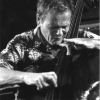Home » Jazz Articles » Album Review » Jean-Jacques Avenel: Waraba
Jean-Jacques Avenel: Waraba
Avenel, who's self-taught on the bass, has been active on the European free music scene for three decades, most prominently working with Steve Lacy since 1981, when he replaced Kent Carter in the straight horn player's quintet. That's where jazz fans will recognize the name and the sound, but for the purposes of this recording it's important to note that Avenel has immersed himself in the music of West Africa for some time now. He's been playing the kora, a harp/lute-like instrument, for over twenty years.
Waraba (which means "the lion" in the Bamana language) is the title of Avenel's Paris-based Manding music project with Yakhouba Sissokho (kora), Lansiné Kouyaté (balafon, a marimba), Moriba Koita (ngoni, a lute), and Michel Edelin (flutes). Avenel plays bass (and kora, on two tracks) on the record, which is evenly split between traditional pieces and originals by members of the group. Other than the acoustic bass and flutes, the instruments that appear here are old as West African music itself (and the liner notes provide some helpful background).
Waraba is mesmerizing, transfixing music where motion seems to blur as time progresses, though the actual notes are quite detailed and interlock in precise and constantly changing patterns. The traditional pieces and the originals are intermixed, but unless you're a student of the music you wouldn't necessarily know which ones are which. Avenel's playing on the solo "Pi-Pande" (on two basses and a kora) is perhaps the most personally revealing about the ways he chooses to connect jazz and Manding forms, and it's anything but predictable. The bass is not traditionally part of this kind of music, so everything he does on the instrument constitutes either an invention or an adaptation.
The group interacts avidly with a candid, open improvisational approach in the process of fleshing out these tunes. The combination of timbres remains organic and balanced, and the DSD recording faithfully reveals every subtle nuance and coloration. Given the overall sprightly dominance of the kora—and credit master kora player Yakhouba Sissokho for bringing the African contingent into this group—this can be viewed as a kora record, but only by listening to Avenel's bass playing can you really appreciate its inherent balance.
Waraba is breathtaking, masterfully inventive, and unpretentious stuff. Mind-blowing, really, whatever your musical background.
This is a hybrid SACD recording.
Track Listing
Lamba; Pi-Pande; Batou Kagni; Guelema; N'Dondore; Jarabi; Kaira; Denko; Destin; Tubaka.
Personnel
Jean-Jacques Avenel
bass, acousticJean-Jacques Avenel (double bass & kora), Yakhouba Sissokho (kora), Lansin Kouyat (balafon), Moriba Koita (n'goni), Michel Edelin (flute, alto flute, bass flute).
Album information
Title: Waraba | Year Released: 2004 | Record Label: Songlines Recordings
Tags
About Jean-Jacques Avenel
Instrument: Bass, acoustic
PREVIOUS / NEXT
Support All About Jazz
 All About Jazz has been a pillar of jazz since 1995, championing it as an art form and, more importantly, supporting the musicians who make it. Our enduring commitment has made "AAJ" one of the most culturally important websites of its kind, read by hundreds of thousands of fans, musicians and industry figures every month.
All About Jazz has been a pillar of jazz since 1995, championing it as an art form and, more importantly, supporting the musicians who make it. Our enduring commitment has made "AAJ" one of the most culturally important websites of its kind, read by hundreds of thousands of fans, musicians and industry figures every month.





















